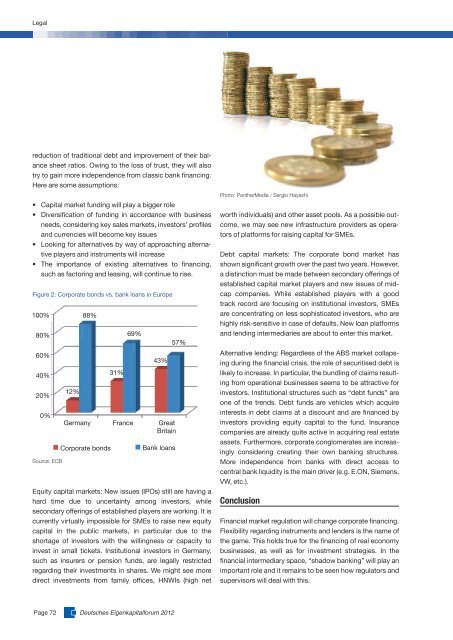Conference Magazine - GoingPublic.de - Deutsches Eigenkapitalforum
Conference Magazine - GoingPublic.de - Deutsches Eigenkapitalforum
Conference Magazine - GoingPublic.de - Deutsches Eigenkapitalforum
Create successful ePaper yourself
Turn your PDF publications into a flip-book with our unique Google optimized e-Paper software.
Legal<br />
reduction of traditional <strong>de</strong>bt and improvement of their balance<br />
sheet ratios. Owing to the loss of trust, they will also<br />
try to gain more in<strong>de</strong>pen<strong>de</strong>nce from classic bank financing.<br />
Here are some assumptions:<br />
• Capital market funding will play a bigger role<br />
• Diversification of funding in accordance with business<br />
needs, consi<strong>de</strong>ring key sales markets, investors’ profiles<br />
and currencies will become key issues<br />
• Looking for alternatives by way of approaching alternative<br />
players and instruments will increase<br />
• The importance of existing alternatives to financing,<br />
such as factoring and leasing, will continue to rise.<br />
Figure 2: Corporate bonds vs. bank loans in Europe<br />
100%<br />
80%<br />
60%<br />
40%<br />
20%<br />
0%<br />
Source: ECB<br />
12%<br />
88%<br />
Germany<br />
31%<br />
France<br />
69%<br />
43%<br />
Great<br />
Britain<br />
Corporate bonds Bank loans<br />
Equity capital markets: New issues (IPOs) still are having a<br />
hard time due to uncertainty among investors, while<br />
secondary offerings of established players are working. It is<br />
currently virtually impossible for SMEs to raise new equity<br />
capital in the public markets, in particular due to the<br />
shortage of investors with the willingness or capacity to<br />
invest in small tickets. Institutional investors in Germany,<br />
such as insurers or pension funds, are legally restricted<br />
regarding their investments in shares. We might see more<br />
direct investments from family offices, HNWIs (high net<br />
Page 72 <strong>Deutsches</strong> <strong>Eigenkapitalforum</strong> 2012<br />
57%<br />
Photo: PantherMedia / Sergio Hayashi<br />
worth individuals) and other asset pools. As a possible outcome,<br />
we may see new infrastructure provi<strong>de</strong>rs as operators<br />
of platforms for raising capital for SMEs.<br />
Debt capital markets: The corporate bond market has<br />
shown significant growth over the past two years. However,<br />
a distinction must be ma<strong>de</strong> between secondary offerings of<br />
established capital market players and new issues of midcap<br />
companies. While established players with a good<br />
track record are focusing on institutional investors, SMEs<br />
are concentrating on less sophisticated investors, who are<br />
highly risk-sensitive in case of <strong>de</strong>faults. New loan platforms<br />
and lending intermediaries are about to enter this market.<br />
Alternative lending: Regardless of the ABS market collapsing<br />
during the financial crisis, the role of securitised <strong>de</strong>bt is<br />
likely to increase. In particular, the bundling of claims resulting<br />
from operational businesses seems to be attractive for<br />
investors. Institutional structures such as “<strong>de</strong>bt funds” are<br />
one of the trends. Debt funds are vehicles which acquire<br />
interests in <strong>de</strong>bt claims at a discount and are financed by<br />
investors providing equity capital to the fund. Insurance<br />
companies are already quite active in acquiring real estate<br />
assets. Furthermore, corporate conglomerates are increasingly<br />
consi<strong>de</strong>ring creating their own banking structures.<br />
More in<strong>de</strong>pen<strong>de</strong>nce from banks with direct access to<br />
central bank liquidity is the main driver (e.g. E.ON, Siemens,<br />
VW, etc.).<br />
Conclusion<br />
Financial market regulation will change corporate financing.<br />
Flexibility regarding instruments and len<strong>de</strong>rs is the name of<br />
the game. This holds true for the financing of real economy<br />
businesses, as well as for investment strategies. In the<br />
financial intermediary space, “shadow banking” will play an<br />
important role and it remains to be seen how regulators and<br />
supervisors will <strong>de</strong>al with this.
















